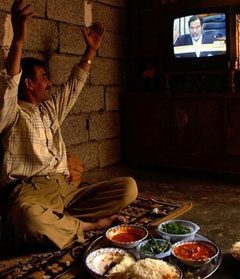|
 |
|
Taxi driver
Khatab Ahmed rejoices as death penalty is told to former leader
Saddam Hussein, in Kirkuk, 290 kilometers (180 miles) north of
Baghdad, Nov. 5, 2006. Iraq's High Tribunal on Sunday found Saddam
Hussein guilty of crimes against humanity and sentenced him to hang,
as the visibly shaken former leader shouted 'God is great!' Ahmed's
brother and uncle were arrested by Saddam's security forces in the
1980s and disappeared forever and his two cousins died in a 1991
Kurdish uprising. [AP] |
Saddam Hussein's death sentence was celebrated by some on Sunday as
justice deserved or even divine, but denounced by others as a
political ploy two days
before critical US midterm
congressional elections.
Worldwide, the range of reactions - including a European outcry
over capital punishment and
doubts about the fairness of the tribunal that ordered Saddam to hang -
reflected new geopolitical fault lines drawn after America's decision to
invade Iraq in 2003 and depose its dictator.
The European Union welcomed the verdict but said Saddam should not be
put to death. At the Vatican, Cardinal Renato Martino, Pope Benedict XVI's
top prelate for justice
issues, called the sentence a throwback to "eye for an eye" vengeance.
"This is not the way to present the new Iraq to the world, which is
different from Saddam, who was behind hundreds of thousands of deaths as
well as death penalty sentences," said Hands Off Cain, an Italian
organization working to rid the world of capital punishment.
Islamic leaders warned that executing Saddam could inflame those who
revile the US, undermining President Bush's policy in the Middle East and
inspiring terrorists.
"The hanging of Saddam Hussein will turn to hell for the Americans,"
said Vitaya Wisethrat, a respected Muslim cleric in Thailand, which has
its own Islamic insurgency in the country's south.
"The Saddam case is not a Muslim problem but the problem of America and
its domestic politics," he said. "Maybe Bush will use this case to tell
the voters that Saddam is dead and that the Americans are safe. But
actually the American people will be in more danger with the death of
Saddam."
Praising the Iraqi judiciary for its independence, the White House
denied arranging for the verdict to be announced just two days before
pivotal elections in which Democrats are fighting for control of Congress.
"The idea is preposterous,"
said Tony Snow, Bush's spokesman.
Although some voiced doubts that Saddam would actually be hanged, the
International Federation for Human Rights denounced the death sentence,
warning that it "will generate more violence and deepen the cycle of
killing for revenge in Iraq." The Council of Europe called it "futile and
wrong" to execute Saddam.
In Pakistan, an opposition religious coalition claimed American forces
have caused more deaths in Iraq in the past 3 1/2 years than Saddam did
during his 23-year rule, and insisted Bush should stand trial for war
crimes.
In the Arab world, some Muslims saw the sentence as divine retribution,
but others decried it as a farce.
"Saddam is being judged by traitors, Americans and Iranians, and those
who came on the backs of American tanks," said Mahmoud al-Saifi of the
Arab Liberation Front.
Iran, which fought an eight-year war against Saddam's Iraq and is a
bitter opponent of the United States, praised the death sentence and said
it hoped that Saddam - denounced by one lawmaker as "a vampire" - still
would be tried for other crimes.
Key US allies - including Britain and Australia - welcomed Sunday's
verdict, which had been widely expected.
(Agencies) |